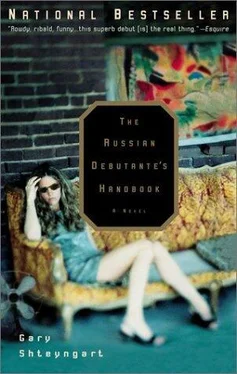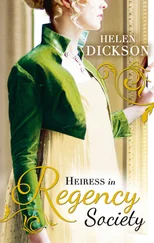Gary Shteyngart - The Russian Debutante's Handbook
Здесь есть возможность читать онлайн «Gary Shteyngart - The Russian Debutante's Handbook» весь текст электронной книги совершенно бесплатно (целиком полную версию без сокращений). В некоторых случаях можно слушать аудио, скачать через торрент в формате fb2 и присутствует краткое содержание. Город: New York, Год выпуска: 2003, ISBN: 2003, Издательство: Riverhead Books, Жанр: Современная проза, Юмористическая проза, на английском языке. Описание произведения, (предисловие) а так же отзывы посетителей доступны на портале библиотеки ЛибКат.
- Название:The Russian Debutante's Handbook
- Автор:
- Издательство:Riverhead Books
- Жанр:
- Год:2003
- Город:New York
- ISBN:0-7865-4177-6
- Рейтинг книги:4 / 5. Голосов: 1
-
Избранное:Добавить в избранное
- Отзывы:
-
Ваша оценка:
- 80
- 1
- 2
- 3
- 4
- 5
The Russian Debutante's Handbook: краткое содержание, описание и аннотация
Предлагаем к чтению аннотацию, описание, краткое содержание или предисловие (зависит от того, что написал сам автор книги «The Russian Debutante's Handbook»). Если вы не нашли необходимую информацию о книге — напишите в комментариях, мы постараемся отыскать её.
and
. The Russian Debutante’s Handbook Bursting with wit, humor, and rare insight,
is both a highly imaginative romp and a serious exploration of what it means to be an immigrant in America.
The Russian Debutante's Handbook — читать онлайн бесплатно полную книгу (весь текст) целиком
Ниже представлен текст книги, разбитый по страницам. Система сохранения места последней прочитанной страницы, позволяет с удобством читать онлайн бесплатно книгу «The Russian Debutante's Handbook», без необходимости каждый раз заново искать на чём Вы остановились. Поставьте закладку, и сможете в любой момент перейти на страницу, на которой закончили чтение.
Интервал:
Закладка:
MAYOR: And when I look at this man, who has suffered such persecution in his homeland and has traveled three thousand miles just to speak out on the very same issues I believe in—on crime, on welfare, on the decline of civic society—well, I just have to think that despite all the naysayers, thank God for—
RYBAKOV (spitting freely): Crime, tphoo! Welfare, tphoo! Civil society, tphoo!
NEWSCASTER: Mr. Rybakov’s brash outspokenness and conservative stances certainly earned him many enemies among the city’s liberal elite.
GRAY-HAIRED BOW-TIED LIBERAL (looking more tired than enraged): I object not so much to this so-called Fan Man’s simplistic views on race, class, and gender but to the whole spectacle of parading around a human being who is obviously in dire need of help just to serve a misguided political purpose. If this is the mayor’s idea of bread and circuses, New Yorkers are not amused.
RYBAKOV shown behind a lectern, cradling a little fan, smiling, his eyes clouded over with pleasure, as he lovingly croons: “Faaan… Faaanichka. Sing ‘Moscow Nights’ for Kanal Seven, please.”
NEWSCASTER: But the end came quickly when the mayor invited Mr. Rybakov to register to vote at an official City Hall ceremony. Television crews from around the country gathered to witness the much-ballyhooed “first vote” of the Fan Man’s life. The streets around City Hall were to be sealed off for the day for a “Fan Man Get-Out-the-Vote Block Party” complete with sturgeon and herring stands, the two staples of the Fan Man’s diet, provided courtesy of Russ & Daughters Appetizing.
MAYOR (holding a piece of sturgeon between thumb and index finger): I’m the grandson of immigrants. And my son is the great-grandson of immigrants. And I’ve always been proud of that. Now I want all you naturalized immigrants to go out there and vote today. If Mr. Rybakov can do it, so can you!
NEWSCASTER: But only an hour before the ceremony was underway, reports leaked out from the mayoral administration that Mr. Rybakov was, in fact, not a citizen. INS records indicate that at a naturalization ceremony held last January, he had attacked Mr. Jamal Bin Rashid of Kew Gardens, Queens, while showering him with racial epithets.
MR. RASHID (dressed in kaffiyeh, excited, speaking in front of his garden apartment): He is shouting at me, “Turk! Turk, go home!” And he’s hitting me on the head, baff! baff! with his, you know, with his crutch. Ask my wife, I am still not sleeping at night. My lawyer says: Sue! But I will not sue. Allah is all-forgiving and so am I.
Cut to Rybakov at a news conference surrounded by mayor’s aides, a REPORTER shouting, “Mr. Rybakov, is it true? Are you a liar and a psychopath?”
Slow-motion shot of Rybakov as he picks up his crutch then sends it flying across the room, where it neatly whacks the offending reporter in the head. Silent shots of melee, Rybakov being tackled by the mayor’s staff while the camera scrambles to get it all. Finally, the audio kicks in, and we hear RYBAKOV screaming: “I am citizen! I am America! Girshkin! Girshkin! Liar! Thief!”
NEWSCASTER: Police experts were unable to identify the term “Girshkin,” but reliable sources tell us that no such word exists in the Russian language. Mr. Rybakov spent two weeks under observation at the Bellevue psychiatric center, while the mayor’s staff attempted damage control.
MAYORAL AIDE (young, harried): The mayor reached out to this man. He wanted to help. The mayor is deeply concerned with the plight of crazed World War II veteran refugees from the former Soviet Union.
NEWSCASTER: But it is today’s investigative report by the Daily News documenting the fact that Mr. Rybakov, here shown at the helm of his thirty-foot speedboat, has been collecting SSI benefits while living in a palatial Fifth Avenue apartment that finally threatens to bring down the mayoral administration… We now go live to the mayor’s news conference…
“SEE! SEE!”Baobab was shouting on the other end. “See what you put me through! I’m trying to take a nap when Rybakov and this crazy Serb knock down the door, and Rybakov’s screaming, ‘Girshkin! Girshkin! Liar! Thief!’ And he’s got the crutches just like on TV. And Challah was in the kitchen dialing 911. I mean, this Fan Man makes Jordi look perfectly reasonable. Hey, how’s it going with you, anyway?”
“Hm?”
“How’s it going?”
“Ah,” Vladimir said.
“Ah?”
“Ah,” Vladimir repeated. “No more. No more, Baobab.” He thought of Jordi. And Gusev. And the Groundhog. “Why fight it? No more.”
“Fight it? What are you talking about? You’re three thousand miles away. Everything’s roses. I just thought you should be warned. Just in case he decides to look for you in Prava.”
“Groundhog,” Vladimir whispered.
“What?
“His son.”
“What about him?”
“Nothing,” he said to Baobab. “Let it go.”
“If you’re trying to quote Paul McCartney, the correct wording is ‘Let It Be.’”
“I have to go,” Vladimir recovered. “Say good-bye to Challah.”
“Hey! I haven’t spoken to you in six months. Where are you going?”
“Concentration camp,” Vladimir said.
34. HOW GRANDMA SAVED THE GIRSHKINS
A CONVOY OFBMWs, Vladimir’s preferred method of traveling these days, pulled into the parking lot of Stadtkamp Auschwitz II–Birkenau. The lot was empty save for one tour bus, its tourists having long disembarked, its Polish driver idling away the time by lovingly cleaning his boots. Vladimir and Morgan had just flown in from London and Cohen had taken the train up from Prava. Cohen’s attempts to replace the BMWs with American autos had run into a snafu. PravaInvest’s jeeps were taking part in one of Gusev’s so-called readiness exercises, of which both NATO and the remains of the Warsaw Pact presumably were not informed. And so Vladimir and his friends were left to commute the three-kilometer distance between Auschwitz proper and its sister camp in the cars of the perpetrators.
They climbed the steps of the main lookout tower, beneath which ran the railroad tracks that kept the ovens supplied. This was the famous tower, a shot of which is requisite in any movie about the camps. For the sake of exaggerated scale, it would seem, many directors had shot the structure from the ground up. In truth, the tower was as squat and unimposing as a station house on the Metro-North railroad.
From the tower, however, the full extent of Birkenau was up for inspection. Rows upon rows of chimneys minus the buildings they were supposed to heat, stretched to the horizon like a collection of miniature factory stacks, bisected by the sandy path of the once busy railroad. The chimneys were all that remained after the retreating Germans, in their last public-relations gesture, dynamited the rest. But in some quadrants, rows of rectangular, ground-hugging barracks still stood, and it was easy to multiply them by the number of orphaned chimneys and in this manner to fill in the gaps of what used to be.
Cohen, consulting his well-worn guide to Europe’s concentration camps, traced his finger against the horizon, and said in an even tone, “There. The ponds of human ashes.” This was at the edge of the field of chimneys before a forest of naked trees began. Living figures could be seen trudging against the backdrop of the forest; perhaps this was the tour group whose bus was abandoned in the parking lot.
A lengthy cloud had passed—the late-winter sun redoubled its efforts, and Vladimir squinted, bringing his hand up to serve as a visor. “What are you thinking?” Cohen said, misinterpreting this gesture for a sign of trauma on Vladimir’s part.
Читать дальшеИнтервал:
Закладка:
Похожие книги на «The Russian Debutante's Handbook»
Представляем Вашему вниманию похожие книги на «The Russian Debutante's Handbook» списком для выбора. Мы отобрали схожую по названию и смыслу литературу в надежде предоставить читателям больше вариантов отыскать новые, интересные, ещё непрочитанные произведения.
Обсуждение, отзывы о книге «The Russian Debutante's Handbook» и просто собственные мнения читателей. Оставьте ваши комментарии, напишите, что Вы думаете о произведении, его смысле или главных героях. Укажите что конкретно понравилось, а что нет, и почему Вы так считаете.












